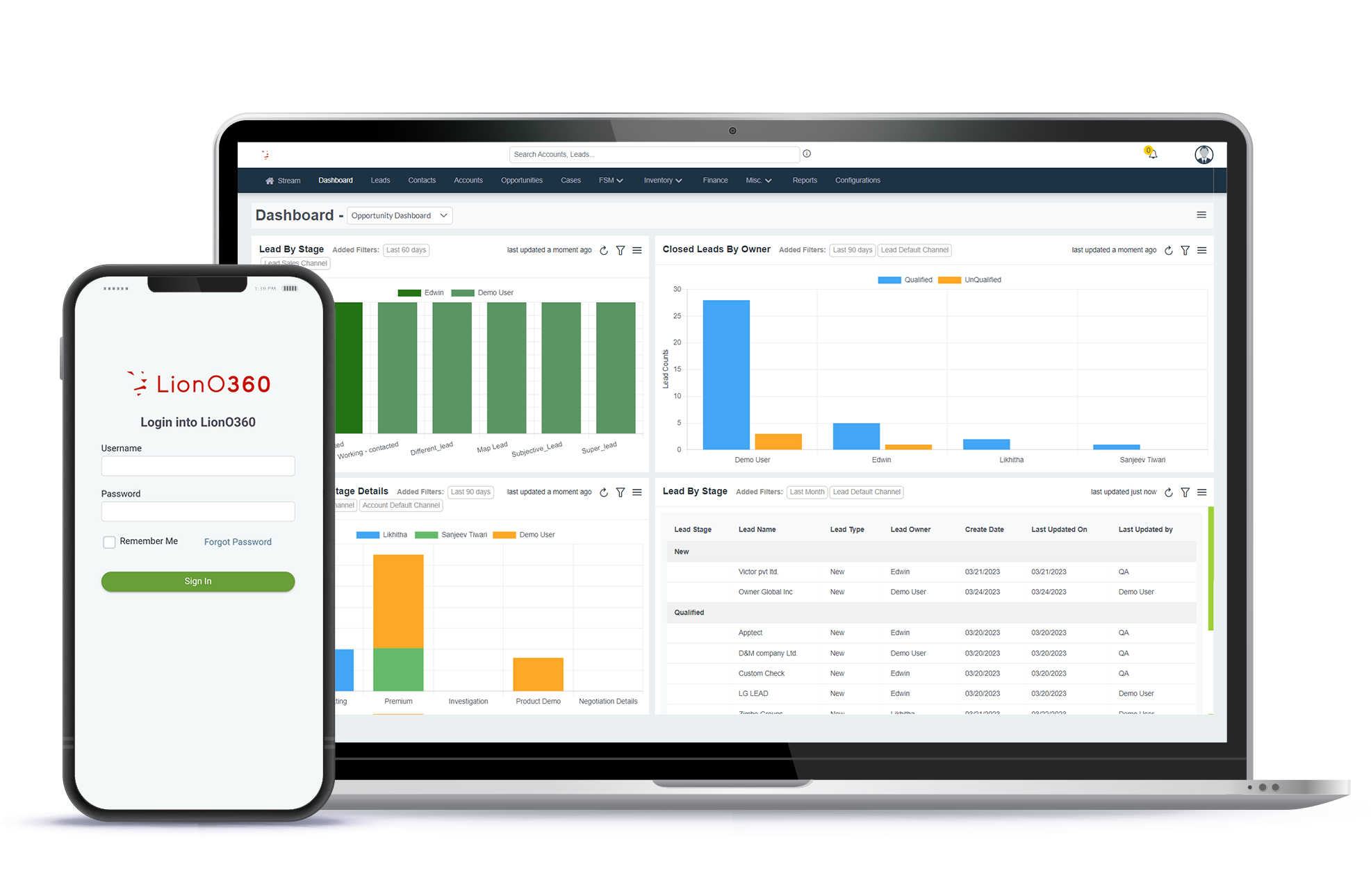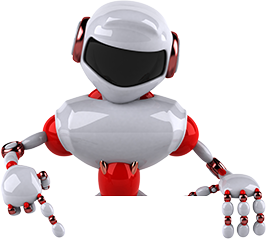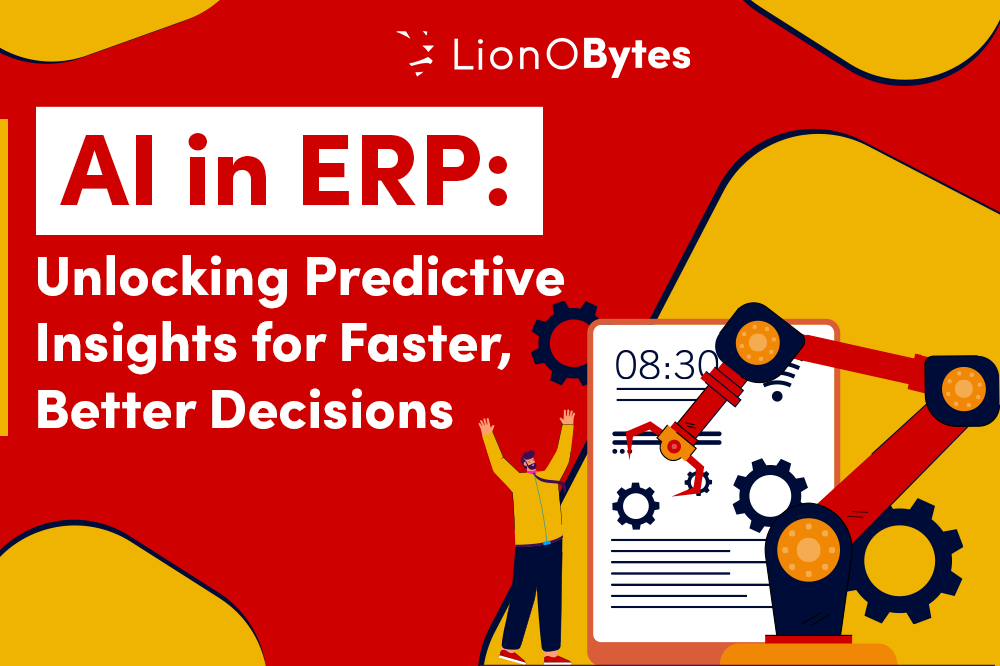
In today's fast-paced, data-driven business environment, agility is everything. Whether facing customer demand, changes in the supply chain, or fluctuating financial trends, a company that can respond quickly and accurately has a competitive advantage. But the question is: how do you make rapid decisions confidently and consistently? The answer is the ability to mix AI and ERP.
The Next Generation in ERP
At a base level, traditional ERP systems are built to start bringing all the company's operations together to manage on a central platform. They provide structure, accuracy, and visibility throughout departments. When it comes to AI, ERP systems have become intelligent. They begin gathering information from historical data, confirming patterns, understanding Ai trends, and automating actions. In addition, instead of telling you what has occurred, the AI-powered ERP have the potential to predict and recommend what to do about it.
What is AI and Why Does It Matter in ERP?
Artificial Intelligence (AI) is the capability of machines to perform human-like functions, such as learning from data, recognizing patterns, predicting, and exercising some automatic response mechanisms that do not require manual action. From a business software perspective, AI enables machines/systems to think forward rather than simply record and react. According to IBM’s definition of AI, AI enables systems to interpret complex data and adapt over time.
So why does this matter for ERP?
Traditional ERP systems are great at storing data for sales, inventory, finances, and more. But here’s the thing: they don’t actually understand any of it.
- That means you’re stuck digging through reports, spotting issues, and making decisions the hard way, manually.
- AI changes all of that. It turns your ERP from a passive database into a smart, proactive assistant.
- Instead of just telling you "Inventory is low," AI predicts when you will run out and when to reorder.
- Instead of catching financial discrepancies after they risk your business, AI spots them before they become problems.
In short, artificial intelligence in ERP doesn’t just show you the data, but also helps you act on it fast.
How AI-Enabled ERP Empowers Business
Let’s break down how the ERP + AI duo helps teams across the business make smarter, faster moves:
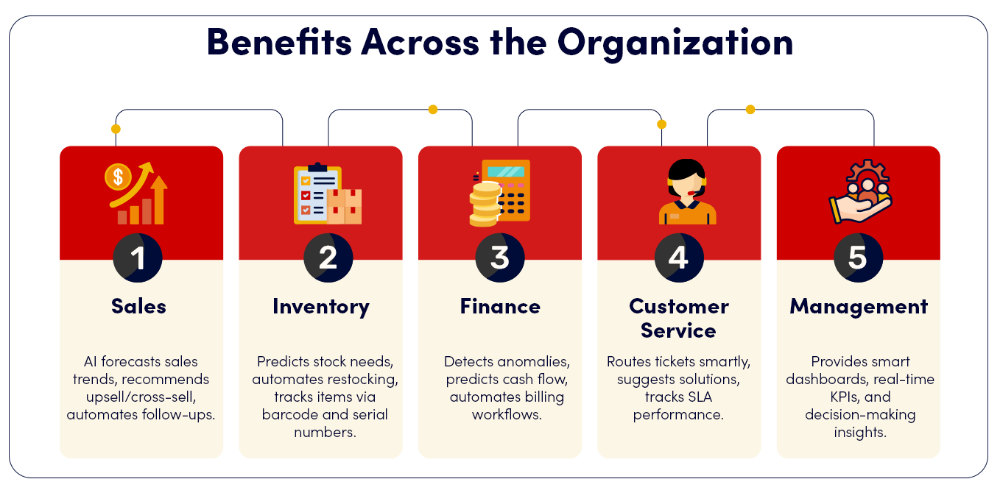
1. Predictive Insights for Proactive Decision-Making
With traditional ERP, managers get reports and dashboards showing the current state of business. But what if your system could forecast sales dips, stockouts, or revenue trends before they occur?
AI uses predictive analytics to identify risks and opportunities early. Sales teams get forecasts based on real buyer behavior. Inventory managers get restock alerts before shelves run dry. Finance teams spot cash flow concerns weeks in advance.
2. Smarter Automation Reduces Manual Work
AI enhances ERP automation by adding intelligence to workflows. For example:
- Invoices are scanned and auto processed using OCR and AI matching.
- Purchase orders are triggered automatically when inventory drops below the threshold.
- Repetitive support tickets are answered via AI chatbots or routed with smart logic.
By learning from past actions, AI can automate even complex, multi-step decisions, freeing teams to focus on value-driven tasks.
3. Personalized User Experience
Modern AI-enabled ERP platforms offer intuitive dashboards and recommendations tailored to each role. A salesperson might see leads most likely to convert. A warehouse manager sees SKUs predicted to spike in demand. Instead of information overload, users get smart, contextual insights to guide their daily decisions.
4. Real-Time Monitoring & Instant Alerts
Imagine your ERP system alerting you about:
- A supply chain delay that will affect delivery timelines.
- An unusual spending spike in one department.
- A sharp decline in one product’s sales regionally.
AI enables real-time anomaly detection, instantly notifying the right teams to act. This shortens response time and prevents small issues from becoming big problems.
5. Adaptive Learning Over Time
Unlike static rules, AI-powered ERP systems evolve. They learn from your organization’s data and outcomes over time. This means your predictions, automations, and insights become increasingly accurate and customized to your business context.
LionO360 ERP: The Future of Intelligent Business Management
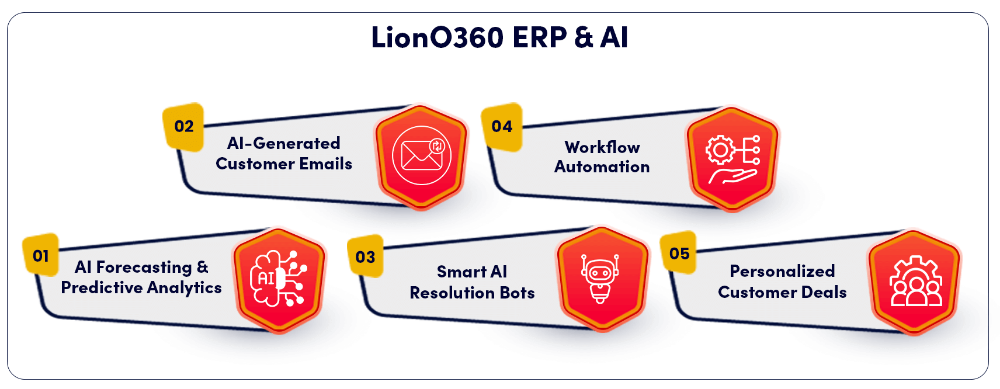
LionO360 ERP represents the future of intelligent business management; unifying AI automation, and deep functionality into one adaptable, scalable platform. It is built for agile businesses ready to streamline operations, empower teams, and grow smarter.
Consider LionO360 as a Leading ERP Software Provider if You:
- Manage multi-warehouse inventory and seek better control.
- Want to automate workflows, business processes, and AI insight.
- Are a manufacturer needing BOM, work orders, and parts tracking.
- Need secure, cloud ERP software with global capabilities and ecosystem Ai integrations.
LionO360 ERP by LionOBytes is a cloud-based Enterprise Resource Planning solution designed for modern, growing businesses. It combines powerful automation, AI-driven intelligence, and seamless integration to create a truly unified business ecosystem. Schedule a free ERP demo now and tap into experts for seamless transfer from legacy systems.
Also Read: AI in ERP: Benefits, Challenges, and Use Cases
Frequently Asked Questions
1. What is the role of AI in ERP systems?
AI enhances ERP systems by transforming them from passive databases into proactive assistants. Traditional ERP systems store and report data but do not interpret it. AI enables ERP to analyze historical data, recognize patterns, and provide predictive insights, allowing businesses to make informed decisions quickly and confidently.
2. How does AI improve decision-making in businesses?
AI provides predictive insights that allow businesses to anticipate trends and issues before they arise. For instance, AI can forecast sales dips, alert inventory managers of potential stockouts, and help finance teams identify cash flow concerns in advance. This proactive approach empowers teams to make smarter, faster decisions.
3. How does AI create a personalized user experience in ERP systems?
Modern AI-enabled ERP platforms offer tailored dashboards and insights for different roles within an organization. For example, sales personnel may receive recommendations for leads most likely to convert, while finance teams see trends affecting profitability. This personalized approach reduces information overload and helps users make better daily decisions.
4. What are the benefits of real-time monitoring and alerts provided by AI in ERP?
AI facilitates real-time monitoring and alerts that help organizations respond to issues promptly. For example, an AI-enabled ERP can notify teams of supply chain delays, unusual spending spikes, or declining product sales in specific regions. This capability reduces response times and prevents minor issues from escalating into larger problems, ensuring smoother operations.

